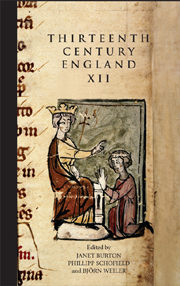Book contents
- Frontmatter
- Contents
- PREFACE
- LIST OF CONTRIBUTORS
- LIST OF ABBREVIATIONS
- The English and the Welsh in Fouke le Fitz Waryn
- Royal Piety in Thirteenth-century Scotland: The Religion and Religiosity of Alexander II (1214–49) and Alexander III (1249–86)
- The 1213 Pipe Roll and Exchequer Authority at the End of John's Reign
- The Public Debate during the Baronial Rebellion
- Richard of Cornwall and the Baronial Opposition in 1263
- Les liens personnels entre les cours de France et d'Angleterre sous le règne de Philippe III, 1270–85
- The Lay Opposition to Edward I in 1297: Its Composition and Character
- Peacekeepers and Lawbreakers in London, 1276–1321
- ‘The peace less kept’? The Origins, Revelations and Impact of Edward I's ‘Trailbaston’ Commissions of 1305–7
- Notes and Documents
- Knightly Society and the Augustinian Canons in the North-west of England
- A Year in the Life of a Royal Justice. Gilbert de Preston's Itinerary, July 1264–June 1265
- Living with Father's Reputation: The Careers of Two Thirteenth-century Oxfordshire Knights of Alien Origin, Thomas de Bréauté and Hugh de Plessis
- The Charters of Richard of Cornwall for the Empire
The Development of the Fine Rolls
from Notes and Documents
Published online by Cambridge University Press: 12 September 2012
- Frontmatter
- Contents
- PREFACE
- LIST OF CONTRIBUTORS
- LIST OF ABBREVIATIONS
- The English and the Welsh in Fouke le Fitz Waryn
- Royal Piety in Thirteenth-century Scotland: The Religion and Religiosity of Alexander II (1214–49) and Alexander III (1249–86)
- The 1213 Pipe Roll and Exchequer Authority at the End of John's Reign
- The Public Debate during the Baronial Rebellion
- Richard of Cornwall and the Baronial Opposition in 1263
- Les liens personnels entre les cours de France et d'Angleterre sous le règne de Philippe III, 1270–85
- The Lay Opposition to Edward I in 1297: Its Composition and Character
- Peacekeepers and Lawbreakers in London, 1276–1321
- ‘The peace less kept’? The Origins, Revelations and Impact of Edward I's ‘Trailbaston’ Commissions of 1305–7
- Notes and Documents
- Knightly Society and the Augustinian Canons in the North-west of England
- A Year in the Life of a Royal Justice. Gilbert de Preston's Itinerary, July 1264–June 1265
- Living with Father's Reputation: The Careers of Two Thirteenth-century Oxfordshire Knights of Alien Origin, Thomas de Bréauté and Hugh de Plessis
- The Charters of Richard of Cornwall for the Empire
Summary
The fine rolls provide a wealth of material of great value to historians of Henry III's reign being, in essence, the principal record of offers of money to the king for an enormous variety of concessions and favours to individuals and corporate bodies, both municipal and religious. They reveal what the king was expected and could be persuaded to grant and the benefits his subjects expected or hoped to be able to win from him. They are therefore crucial in understanding networks of patronage and debt and credit, and the increasingly rapid changes to the law, the position of women and the seigneurial landscape and economy in the thirteenth century.
Each fine roll was compiled in Latin by a handful of scribes, and a total of sixty-four rolls containing around eight hundred membranes, one for almost all of the fifty-six years of Henry III's reign from 1216 to 1272, survive in The National Archives at Kew in the series C 60. The earliest example is from 1199, the first year of John's reign, making it co-terminus with the first charter roll, a running record of the king's grants by charter, and slightly antedating the close and patent rolls, records of outgoing letters from the royal Chancery, all of which helped rationalise and regularise royal bureaucratic authority in England. Running to twenty-three membranes, however, this ‘first’ extant fine roll was a well-developed instrument of government.
- Type
- Chapter
- Information
- Thirteenth Century England XIIProceedings of the Gregynog Conference, 2007, pp. 193 - 205Publisher: Boydell & BrewerPrint publication year: 2009



